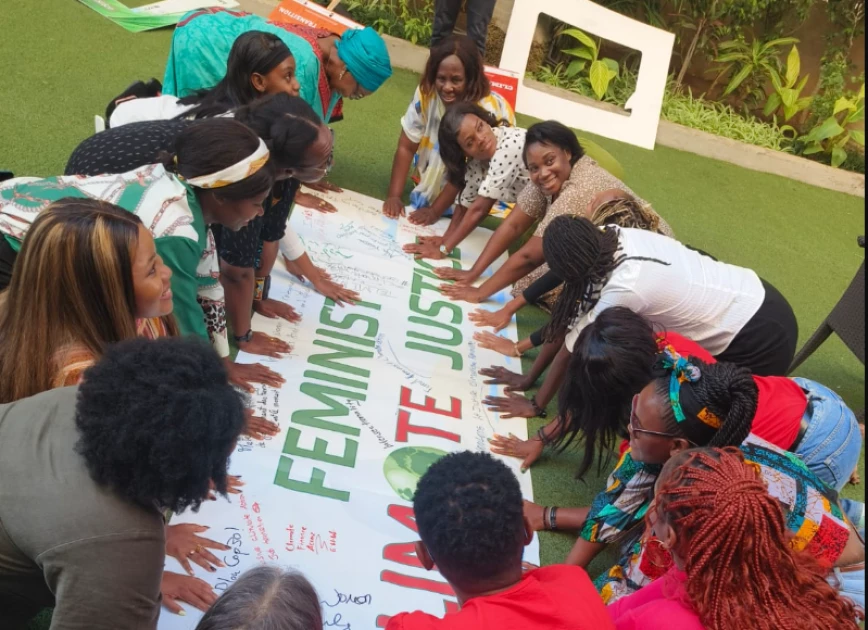As COP30 nears, feminist voices demand climate finance justice


Audio By Vocalize
Across Africa, the shrinking climate financing space, unfulfilled financial obligations, overlooked areas of funding, and gender insensitivity remain major concerns for countries that bear the brunt of the climate crisis.
In the coastal city of Maputo, Mozambique, the 3rd Feminist COP on Climate Change — themed around a feminist and just climate future — concluded with a resounding call for realism from climate conveners and stakeholders in both the Global North and South.
The engagements reflected a collective understanding of resistance against oppressive structures and a reimagining of a future where African women are not merely recipients of financial aid but architects of climate solutions within their communities.
In Kenya, 23-year-old Faith Adoyo, founder of Fashion Upcyclers — a grassroots climate resilience project focused on recycling textile waste in Nairobi’s Mathare slums — shared her inspiration for addressing the fashion industry’s waste problem and the structural barriers that hinder access to financing such as the Financing Locally-Led Climate Action (FLLoCA) program.
During the heavy rains of April–May 2024, Mathare suffered severe flooding as the river overflowed into homes, sweeping away lives and property.
Adoyo, born and raised in Mathare, noted that textile waste dumped into the river contributed significantly to the overflow, as the heavy waste materials often pile up and block water flow. A year later, she developed an innovative approach to reduce textile waste and launched a campaign against dumping in the river. Her initiative has since employed more than 20 youth and women, though she continues to struggle to secure funding to expand the project.
Financing Locally-Led Climate Action (FLLoCA) is a Kenyan program supported by donors through the national government in partnership with county governments. It aims to help communities build local climate resilience. However, complaints have surfaced that accessing the funds is a nightmare due to unrealistic and exclusionary gatekeeping structures, including age and gender discrimination.
“Local green finance at the grassroots level is a hoax. You have to know someone in a senior county government position to lobby on your behalf; otherwise, you can’t even begin the funding application process,” said Adoyo.
“It’s unfortunate that youth are not represented in most of these financing offices. The men in senior positions often feel entitled, and when you’re both young and a woman, it’s even worse. They believe you can’t possibly have anything constructive that qualifies you for the funds,” she added.
Adoyo’s story mirrors hundreds of similar cases that, according to conveners of the 2025 Feminist COP, demand urgent redress.
Ann Tek, Climate Justice Coordinator at FEMNET, stated:
“We need climate funding that is gender-sensitive — a reconfiguration that not only acknowledges women’s lived experiences but invests in their leadership and knowledge systems.”
Tek reminded climate finance “gatekeepers” that climate finance is not charity but a form of reparative and restorative justice — essential for enabling Africa’s self-determined future.
Natalie Mukundane, representing the African Youth Commission (AYC) at the Feminist COP in Mozambique, challenged the persistent doubt cast on young women’s capacity to lead in policy and climate governance. She noted the powerful shift as youth increasingly claim these spaces with courage and innovation.
“My call to COP30 is urgent — funding for women and girls must be accessible, transparent, and shielded from corruption and bureaucratic decay,” she said.
Mukundane further urged the dismantling of hollow narratives around “capacity,” calling for real investment in youth-driven resilience and adaptation.
Above all, she emphasized the importance of protecting spaces where young women can freely share their stories — because their voices are not optional; they are transformative.
Currently, the UNFCCC is working to integrate gender considerations into climate finance through initiatives such as the Gender Action Plan (GAP) and the inclusion of gender-responsive measures in mechanisms like the Green Climate Fund. However, feminists argue that progress remains painfully slow.
As the world prepares for COP30, feminist climate advocates are calling for workable policies and structural reforms to address inequities and ensure that climate adaptation programs are both effective and inclusive.


Leave a Comment